Announcing: Catalog #360 for November, 2025 – Rare & Early Newspapers…
October 31, 2025 by GuyHeilenman · Leave a Comment
|
|
Who’s Who in Newspapers? Citizen Genêt edition…
October 10, 2025 by GuyHeilenman · 1 Comment
The 10th installment of Who’s Who in Newspapers
Citizen who? While exploring newspapers from the 18th and early 19th centuries over the past few decades, I noticed the name “Citizen Genet” appearing more than once—always tied to some sort of “affair.” As a novice historian at the time (my academic background is actually in mathematics and engineering), and given my aversion to sensationalized “yellow journalism,” I let it pass. With tens of thousands of fascinating topics to explore through our beloved collectible, I never stopped to uncover who he really was or what his “affair” involved.
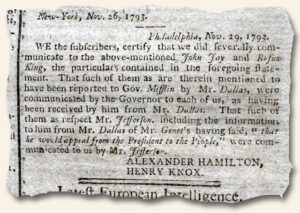 Recently, however, I embraced the old adage that “it’s never too late to learn” and finally took the plunge. What I found was a story worth the effort, one that offered both historical insight and a better appreciation for the newspapers that recorded it. A summary of my discovery is as follows:
Recently, however, I embraced the old adage that “it’s never too late to learn” and finally took the plunge. What I found was a story worth the effort, one that offered both historical insight and a better appreciation for the newspapers that recorded it. A summary of my discovery is as follows:
Edmond-Charles “Citizen” Genet was a French diplomat sent to the United States in 1793 to gain American support for France’s wars with Britain and other European powers. Instead of observing diplomatic protocol, he jumped right into recruiting privateers to attack British ships and encouraging Americans to take up arms against Spain. These moves directly violated President George Washington’s Neutrality Proclamation of 1793. To make matters worse, Genet bypassed Washington altogether and appealed directly to the American public, an act that came across as both disrespectful and threatening to U.S. sovereignty.
The uproar that followed—known as the “Citizen Genet Affair”—quickly became a defining moment in America’s early history. Washington demanded Genet’s recall, reinforcing both the president’s authority in foreign affairs and the new nation’s commitment to neutrality. At home, the controversy deepened political divisions: Federalists supported Washington’s cautious stance, while Democratic-Republicans sympathized with revolutionary France. In the end, Genet was granted asylum in the United States and lived out his life in New York, but his story left behind a lasting lesson in diplomacy and America’s determination to remain independent from foreign influence.
So much for jumping to conclusions regarding his “affair”. I should have known better.
The photos shown are from two articles within the Columbian Centinel, Dec. 11, 1793. – the above in full, and the below of only an excerpt due to the length of the article. If original newspapers on this topic remain available, they would be found at: CITIZEN GENET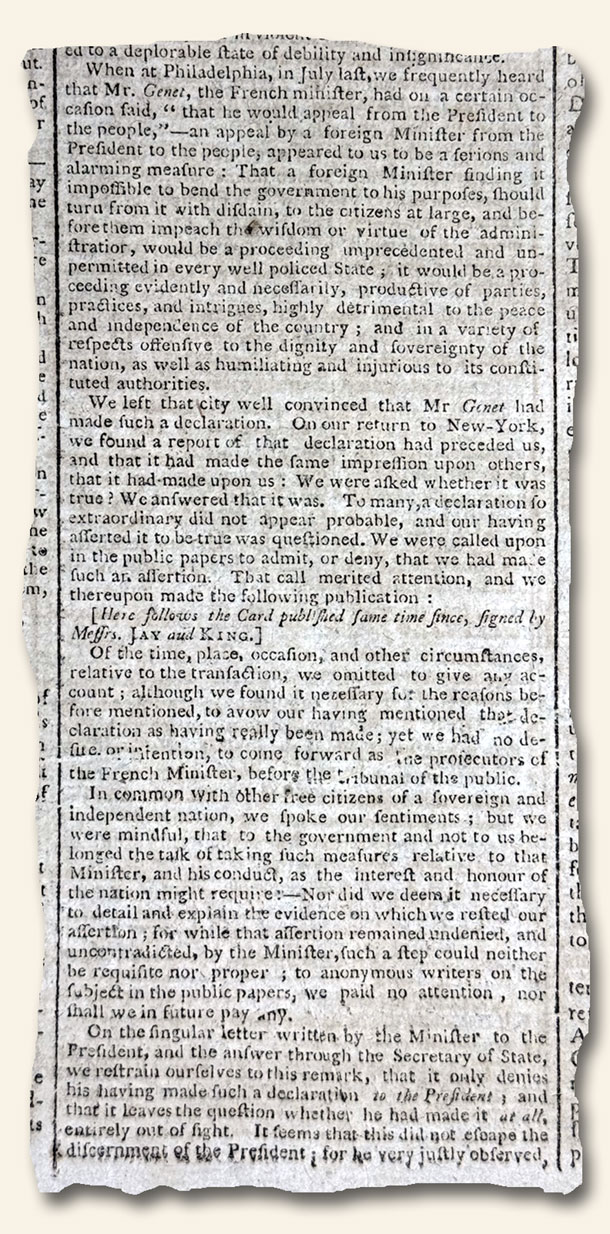
Lead-up to a Nation… as reported in the newspapers of the day (Intro & Sept., 1775)…
October 3, 2025 by GuyHeilenman · Leave a Comment

British News Delayed – Lead-up to a Nation (E5)
Lord Dunmore and Colonial Unrest – Lead-up to a Nation (E6)
Patrick Henry – Lead-up to a Nation (E7)
Benjamin Franklin – Lead-up to a Nation (E8)
We hope you are enjoying this year-long trek to the 250th anniversary of The United States through the eyes of those who were fully engaged, first hand. As mentioned previously, all accounts are rooted in what they read in the newspapers of the day.
“History is never more fascinating than when read from the day it was first reported.” (Timothy Hughes, 1975)
Announcing: Catalog #359 for October, 2025 – Rare & Early Newspapers…
September 30, 2025 by GuyHeilenman · Leave a Comment
|
|
Is it Patriot Day, Patriot’s Day, or are they interchangeable?
September 11, 2025 by GuyHeilenman · Leave a Comment
Is it Patriot Day? Yes. Is it Patriot’s Day? Yes again. Are they interchangeable? If someone had asked me yesterday, I would have thought they were one and the same; but the answer is: No! So, for those like me who thought they were one and the same, I hope what follows clears things up.
 Patriot Day
Patriot Day
Patriot Day is a United States observance held every year on September 11 to honor the nearly 3,000 people who lost their lives in the terrorist attacks on September 11, 2001. Established by a joint resolution of Congress and signed into law in 2002, the day commemorates the victims of the attacks on the World Trade Center, the Pentagon, and United Airlines Flight 93, as well as the first responders who risked and sacrificed their lives. Americans observe the day with moments of silence, memorial services, and the lowering of flags to half-staff as a tribute to national resilience and remembrance.
Shown to the left is a report from the Los Angeles Times, dated Sept. 11, 2001.
Patriot’s Day
Patriots’ Day is a U.S. holiday commemorating the battles of Lexington and Concord, the first military engagements of the American Revolutionary War, fought on April 19, 1775. It originated in Massachusetts in the late 19th century to honor the bravery and sacrifice of colonial militiamen who resisted British forces. The holiday is observed annually on the third Monday in April, primarily in Massachusetts and Maine, with re-enactments, parades, and athletic events like the Boston Marathon. Patriots’ Day serves as a reminder of the American colonies’ fight for independence and the birth of the United States.
The following is a report from The New England Chronicle dated Sept. 7, 1775.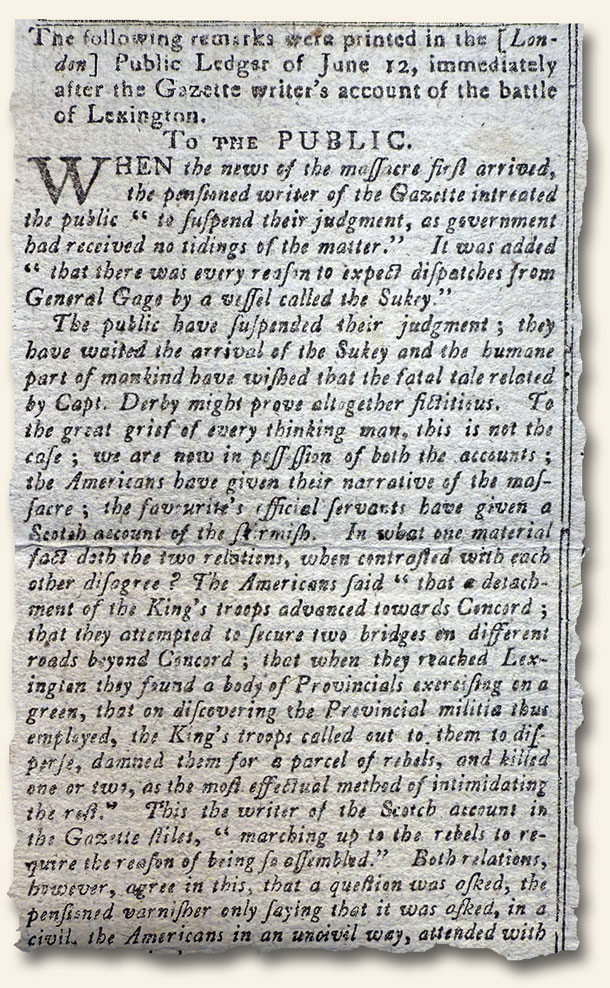
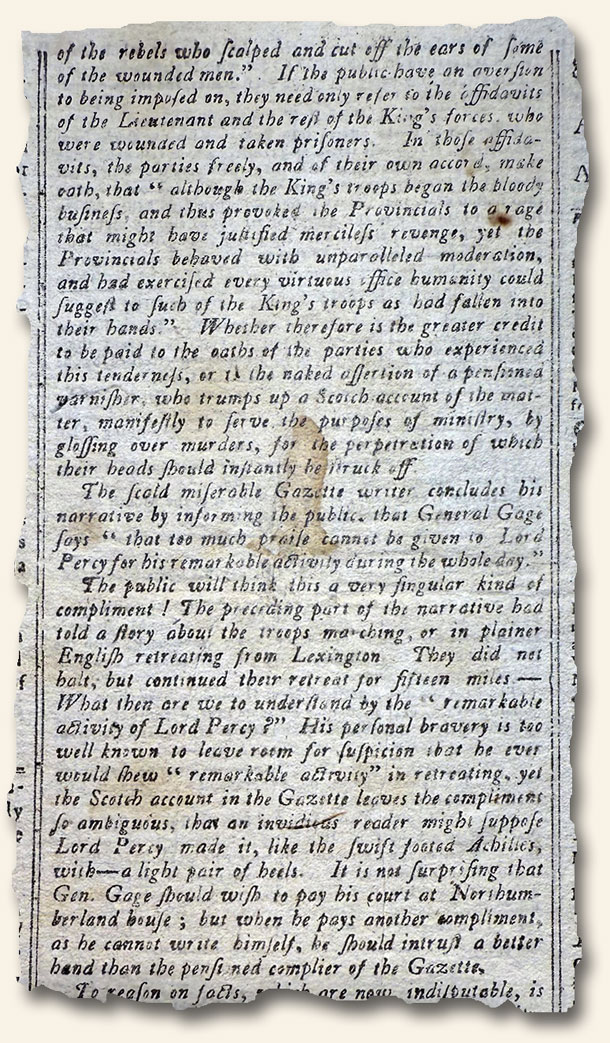
Singers & Songwriters – 1776 edition…
September 8, 2025 by GuyHeilenman · Leave a Comment
Flashback – 1776
“And, the award for the songwriter of the year goes to… ‘wait for it… wait for it…’* … Benjamin Franklin, for his chart-busting mega-hit: “The KINGS own REGULARS, and their TRIUMPH over the IRREGULARS.”
Was there anything this man could not do? I could be wrong, but if those who have explored the life of this amazing forefather were asked to list his talents and accomplishments, I’m guessing that “lyricist” would not make anyone’s list. Yet, although unsigned, the satirical ditty printed in the Pennsylvania Evening Post on March 30, 1776 (shown below) has finally been universally acknowledged as being from his pen (and not just an autopen with his name on it). Furthermore, the fact that it would have likely topped the charts in such an historic year (1776) makes him a shoe-in for eventual entry into the Musicians Hall of Fame and Museum. Sadly, whether through the distraction of competing interests, lack of funding, or perhaps the waning of ongoing inspiration, history has proven him to be classified as a “one-hit wonder”. What a shame; he was off to such a great start.


*Quote borrowed from Ketanji Brown Jackson, honorable Associate Justice of the SCOTUS.
Lead-up to a Nation… as reported in the newspapers of the day (Intro & August, 1775)…
September 5, 2025 by GuyHeilenman · Leave a Comment

Shown below are the first four installments.
The Necessity of Taking Up Arms – Lead-up to a Nation (E1)
The Olive Branch Petition – Lead-up to a Nation (E2)
The Speech of Edmund Burke – Lead-up to a Nation (E3)
England Declares War – Lead-up to a Nation (E4)
We hope you enjoy this year-long trek to the 250th anniversary of The United States through the eyes of those who were fully engaged, first hand. All accounts will be through what they read in the newspapers of the day. After all, as Tim Hughes proclaimed back in 1975: “History is never more fascinating than when read from the day it was first reported.”
A 49 year search comes to an end… The 1765 “Tombstone” issue…
September 1, 2025 by TimHughes · Leave a Comment
There are a number of iconic American newspapers that every collector desires, most are for content alone such as the Declaration of Independence, the Constitution, the assassination of Abraham Lincoln, etc.
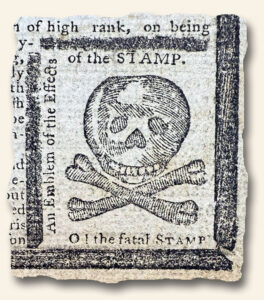 Not many are desired for both historical significance as well as graphic appeal, but such is the case with the Pennsylvania Journal of October 31, 1765. Having been aware of it for many years (photos are found in many high school history books), I had always been in the search for a genuine issue (beware: many reprints exist). I came close about 35 years ago when an institution, which had two in their collection, gave thought to exchanging one with me for an unknown Philadelphia newspaper I had discovered. Ultimately, they opted not to do the swap, so the search was back on.
Not many are desired for both historical significance as well as graphic appeal, but such is the case with the Pennsylvania Journal of October 31, 1765. Having been aware of it for many years (photos are found in many high school history books), I had always been in the search for a genuine issue (beware: many reprints exist). I came close about 35 years ago when an institution, which had two in their collection, gave thought to exchanging one with me for an unknown Philadelphia newspaper I had discovered. Ultimately, they opted not to do the swap, so the search was back on.
It ended earlier this year.
This particular edition, famously known as the “tombstone edition,” used striking visual and textual elements to express colonial outrage over the Stamp Act tax, which required many printed materials, including newspapers, to bear a revenue stamp. This tax directly impacted printers and publishers, placing a heavy economic burden on them and fueling widespread resistance.
As seen in the photos, the masthead featured a skull and crossbones, a powerful symbol representing the “death” of the press under the weight of the Stamp Act. Also, an engraving of a coffin appears at the bottom of the back page, captioned: “The last Remains of the PENNSYLVANIA JOURNAL Which departed this Life, the 31st of October, 1765, Of a Stamp in her Vitals, Aged 23 Years.”
Publisher William Bradford begins the issue with poignant commentary, including: “I am sorry to be obliged to acquaint my readers, that as The Stamp Act is fear’d to be obligatory upon us after the First of November ensuing (the fatal to-morrow) the publisher of this paper unable to bear the burthen, has thought it expedient to stop a while, in order to deliberate whether any methods can be found to elude the chains forged for us…”.
Published just one day before the Stamp Act’s enforcement, this edition cleverly voiced dissent without yet violating the law, making it a strategic act of defiance.
This “tombstone edition” of the Pennsylvania Journal captured this economic strain and transformed it into a public rallying cry.
This edition stands as a vivid example of how the colonial press used creativity to oppose British policies, contributing to the growing revolutionary sentiment. It underscores the critical role newspapers played in shaping public opinion and mobilizing opposition in the years leading up to the American Revolution.
While other newspapers also protested the Stamp Act, the Pennsylvania Journal’s dramatic tombstone imagery made it particularly memorable and influential. It galvanized public resistance, cementing its place as a powerful symbol of defiance in American history.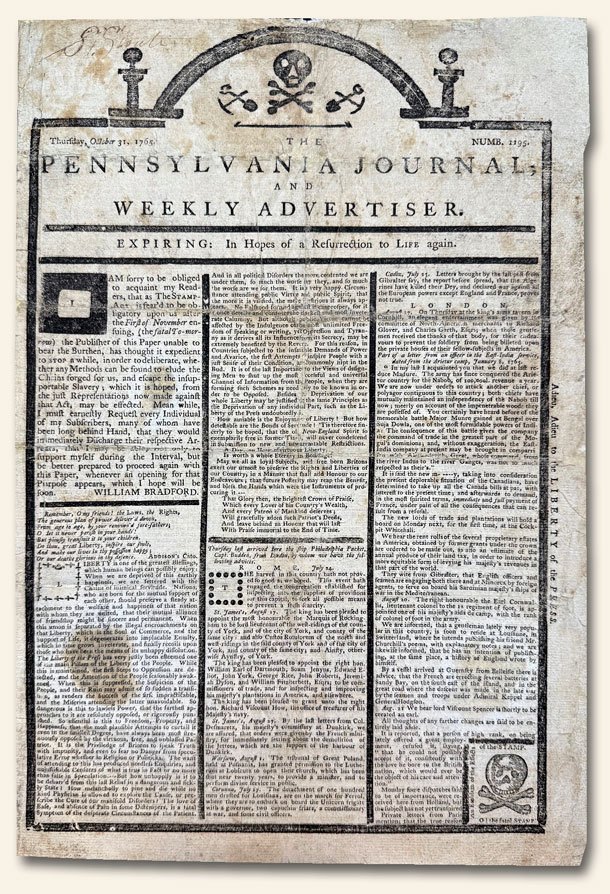
Announcing: Catalog #358 for September, 2025 – Rare & Early Newspapers…
August 29, 2025 by GuyHeilenman · Leave a Comment
|
|
A “hidden gem” within a 1785 newspaper leads to discovery, inspiration, and a correction…
August 22, 2025 by GuyHeilenman · Leave a Comment
Just for fun, guess the author and approximate date the following “Address to America” was published:
“PEOPLE of North America! Let the example of all nations which have preceded you, and especially that of the mother country, instruct you. Be afraid of the influence of gold, which brings with luxury the corruption of manners and contempt of laws; be afraid of too unequal a distribution of riches, which shews a small number of citizens in wealth, and a great number in miser; whence arises the insolence of one, and the disgrace of the other, Guard against the spirit of conquest; the tranquility of the empire decreases as it is extended; have arms to defend yourselves, and have none to attack.
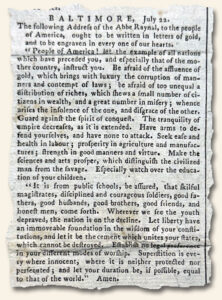 Seek ease and health in labour; prosperity, in agriculture and manufactures; strength, in good manners and virtue. Make the sciences and arts prosper, which distinguish the civilized man from the savage. Especially watch over the education of your children.
Seek ease and health in labour; prosperity, in agriculture and manufactures; strength, in good manners and virtue. Make the sciences and arts prosper, which distinguish the civilized man from the savage. Especially watch over the education of your children.
It is from public schools, be assured, that skillful magistrates, disciplined and courageous soldiers, good fathers, good husbands, good brothers, good friends, and honest men come forth. Wherever we see the youth depraved, that nation is on the decline. Let liberty have an immovable foundation in the wisdom of your contributions and let it be the cement which unites your states, which cannot be destroyed. Establish no legal preference in your different modes of worship. Superstition is every where innocent when it is neither protected nor persecuted; and let your duration be, if possible, equal to that of the world.”
I recently discovered this address on page 3 of The Independent Gazetteer; or, The Chronicle of Freedom dated July 30, 1785. After a bit of digging, in my humble opinion, a trek into the life of its author, Abbé Raynal, promises to not disappoint.
As for his “Address to America” itself, one cannot help but think his words fell on deaf ears. Sadly, even if we wanted to hit the reset button and start again while heeding his warnings, the last paragraph is problematic considering the current state of public education. However, as difficult as it would be to change course, status quo is obviously not an option.
As for the correction mentioned in the above heading for this post…
Multiple resources claim Abbé Raynal’s Address was first published posthumously (in 1800). It’s always fun when an old newspaper can prove the “experts wrong”.
A summary of the address using multiple AI resources is as follows:
Abbé Raynal’s “Address to America” is a powerful message written during the American Revolution in which the French Enlightenment thinker praises the American colonies for their fight for independence from British rule. He commends the courage of the revolutionaries and their commitment to liberty, viewing the struggle as a monumental step forward for human freedom. Raynal sees the revolution as a chance for a new nation to break from the oppressive traditions of Europe and create a society founded on justice, equality, and natural rights.
However, Raynal does not offer unconditional praise. He sharply criticizes the continued practice of slavery in the American colonies, pointing out the contradiction between fighting for freedom while denying it to enslaved people. He also expresses concern over the treatment of Indigenous peoples and warns the new republic against replicating the colonial abuses of European empires. His address is both a celebration of America’s potential and a moral challenge to align its actions with the ideals it professes.
The significance of Raynal’s message lies in its early and public call for America to confront its moral failings. His address exemplifies the Enlightenment belief that political freedom must be accompanied by social and ethical responsibility. By urging America to live up to its revolutionary ideals, Raynal’s words contributed to a broader conversation about liberty, justice, and the true meaning of independence—conversations that would shape not only American history but global ideas about human rights.





 Catalog #360 (for November)
Catalog #360 (for November)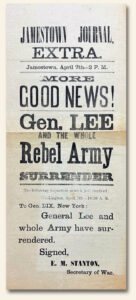 October’s catalog (#359)
October’s catalog (#359)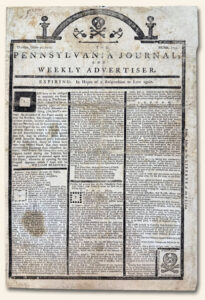 September’s catalog (#358)
September’s catalog (#358)